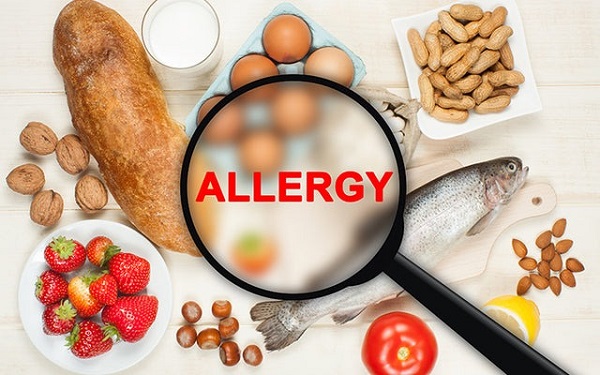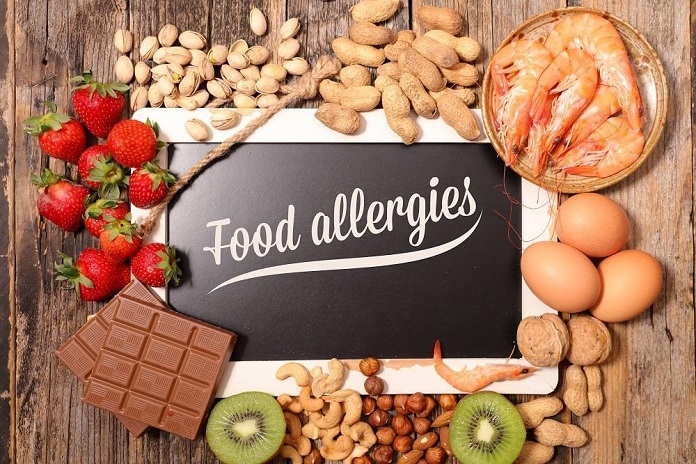Food allergy: Various types of food cause serious food allergies. Food allergies are developed when a person eats, touches or inhales some protein in food is called an allergen.
Besides, a tiny amount of the allergy-causes food can trigger such as digestive problems, hives or swollen airways. Some people may be the prey of the serious health problem whole a food allergy can cause severe symptoms or even a life-threatening reaction known as anaphylaxis.
However, Common food allergies include dairy, peanuts, and tree nuts.
What are Food Allergies?
Food allergies are likely to happen when your immune system reacts to a protein of the foods because it smells as threatening. However, there are two types of allergic reactions to food,
- Immunoglobulin E (IgE) mediated: This is the most common type of allergic reaction which happens when IGE antibodies release a chemical called histamine to fight off the perceived invader. The histamine causes the typical allergy symptoms which lead to anaphylaxis and could be life-threatening.
- Non-IgE mediated: This is the reaction when other parts of the immune system respond against the perceived threat.

Food allergy – Causes
Multiple factors can cause food allergy, however here are some of the factors that cause food allergies,
- Genetics: It is likely to get common that if one or both parents have food allergies to one food then, the specific allergy may not necessarily be the same.
- Immune System: A person with food allergies is likely to get the allergies when their immune system mistakenly identifies certain proteins in food as harmful invaders, triggering an immune response.
- Allergic foods: However, there are a lot of foods in the market found with the allergic protein For example foods found with the protein called gluten are likely to have a high chance of food allergies.
- Environmental Factors: It might sound unrealistic but, indeed, Environmental factors such as pollution, changes in diet, and exposure to certain microbes may also influence the development of food allergies.
What are 10 common foods that cause food allergies?
Many types of food can cause food allergies here are the 10 common foods that can cause food allergies.

Do tree nuts cause food allergies?
Yes, Tree nuts can cause food allergies, a tree nut is a type of the allergies that are typically grown on trees. Tree nuts include almonds, walnuts, cashews, pistachios, hazelnuts, Brazil nuts, pecans, macadamia nuts, and pine nuts. Besides this, tree nuts can cause anaphylaxis a life-threatening allergic reaction that requires immediate medical attention. The Symptoms of anaphylaxis are difficulty breathing, a sudden drop in blood pressure, loss of consciousness, and cardiac arrest.
How to avoid allergy food?
There are various ways to avoid food allergy reactions, here are some tips that might be helpful for you to avoid allergy-triggering foods:
Know Your Allergens: Before having any kinds of specific foods identify what triggers your allergies however some allergic foods include, peanuts, tree nuts, milk, eggs, soy, wheat, fish, and shellfish.
Read the product labels: While buying anything from the market or the grocery shop look for the mention of allergens or potential cross-contamination. On the food label, you can see the substances if they contain common allergens or if they were processed in facilities that handle allergenic foods.
Be Aware of Hidden Ingredients: While buying goods from the market be alert be aware of the hidden ingredients suppose, watch out the terms like “casein” (milk protein), “albumin” (egg protein), “soy lecithin,” and “wheat starch.” So always be aware of hidden ingredients before buying any products from the market.
Ask Questions When having food Out: When you go out for a meal make sure to ask about the ingredients and how dishes are prepared.
Communicate Clearly: While you go to the family dinner or the get-together parties, Make sure your friends, family members, coworkers, and anyone else involved in food preparation are aware of your food allergies.
Prepare Your Meals at Home: Cooking your favourite meal at home is the best way to be aware of allergies to substances, while cooking food at your home you will get to know all kinds of ingredients and also you will be aware of the substances that you are using.
Stay updated: Before having any kind of food or using any kind of produce you must need to Stay up-to-date on food labelling regulations, allergy awareness, and emerging research on food allergies to maintain your healthy lifestyle.
Carry Medications: Always make sure to carry prescribed medications, such as antihistamines or epinephrine auto-injectors (e.g., EpiPen), in case of accidental exposure to allergic food.
FAQs
What are Food Allergies?
Food allergies are likely to happen when your immune system reacts to a protein of the foods because it smells as threatening.
What causes food allergies?
Various factors can cause food allergies, some of the factors that cause food allergies are, Genetics, Immune system, Early Exposure, Environmental Factors, Cross-Reactivity, Leaky Gut Syndrome and many more.
Do environmental factors play a role in food allergies?
Yes, environmental factors play a vital role in food allergies, It might sound unrealistic but, indeed, Environmental factors such as pollution, changes in diet, and exposure to certain microbes may also influence the development of food allergies.
Can food allergies be genetic components?
Yes, genetics can play a role in the development of food allergies. It is likely to get common that if one or both parents have food allergies to one food then, the specific allergy may not necessarily be the same
Also, read more about Chicken Breast Nutrition Information and Health Benefits


